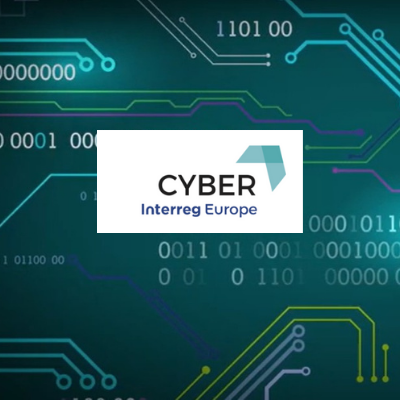The project started its 2nd phase on the 1st of June 2021 and will be dedicated to the implementation, monitoring and follow-up of the defined regional Action Plans, which will help regional authorities to improve the policy instruments targeted by each partner region (Operational Programme or Cybersecurity Strategy, depending on the region) in order to boost the competitiveness of local cyber-SMEs.
Cybersecurity is a key enabler for the development and exploitation of innovation and digital technologies. It is therefore necessarily linked to the prospects for growth, job creation and meeting the environmental and social challenges of the future.
The relevance of cybersecurity is reflected both at European and national level. The project CYBER is funded by the European Regional Development Fund (ERDF) with a budget of 1.53 million euros and gathers 9 institutional partners across Europe; including the Institute for Business Competitiveness of Castilla y León -ICE- (Spain) and Bretagne Development Innovation Agency (France) as the Lead Partner, and the European Cyber Security Organization (ECSO) as the Advisory Partner.
In the initial period of the project, the main barriers to interregional collaboration between European Regional Cybersecurity Ecosystems were identified. Namely a lack of coordination between relevant actors, cybersecurity skills gap and market fragmentation were discovered. In order to overcome them and improve the competitiveness of the regional SMEs, different regional Good Practices were shared.
The ICE, in collaboration with the National Cybersecurity Institute (INCIBE) and the main regional stakeholders, carried out numerous informative and awareness-raising actions for companies and the business sector on the importance of cybersecurity. They also raised awareness on the main risks to which organizations are exposed. Among these actions, it is worth highlighting the 1st Regional Cybersecurity Forum, which brought together different actors related to information security in digital environments, to stimulate awareness among the business sector of the risks and threats in terms of cybersecurity, and to give continuity to other projects to consolidate a cybersecurity ecosystem in regions that provides answers to current and future challenges, contributing to the improvement of the competitiveness of companies. The Cyberbreakfasts, local events to provide companies with information on how cybersecurity affects their business, have also been held with a high level of participation.
Parallel activities during the first phase included the organization of a Cybernight, Cyberexercise called "Capture the Flag”― a hacking competition aimed at research groups in which 14 teams took part. This event was designed to identify talent among the participants and test their knowledge, skills and abilities by solving computer challenges that exploit software weaknesses. Similar competitions have been organized in other partner regions of the CYBER project, all of which have been very successful (see review).
Another project initiative is the realization of a European mapping of regional cybersecurity capabilities, giving greater visibility and access to markets for all registered entities.
Cybersecurity will have a great impact on the economy and digitization of the European Union in the coming years. Programs such as INTERREG, that promotes the cooperation of public authorities and regions for mutual knowledge and benefit, allows regions to move forward in times of transformation as complex as the current one. As an example and a source of inspiration at regional level, an agreement for the creation of the Cybersecurity Innovation Hub in Castilla y León has been created. According to the Regional Research and Innovation Strategy for Smart Specialization in Castilla y León (RIS3) 2014-2020, cybersecurity in this region has strengths in very specific areas as it has relevant infrastructures and critical mass in ICT areas.
More information
Projects like CYBER open the doors to the future of SMEs and advance the region’s economy.
Read more about the project here.
You can watch the promotional video of the project in this link.
